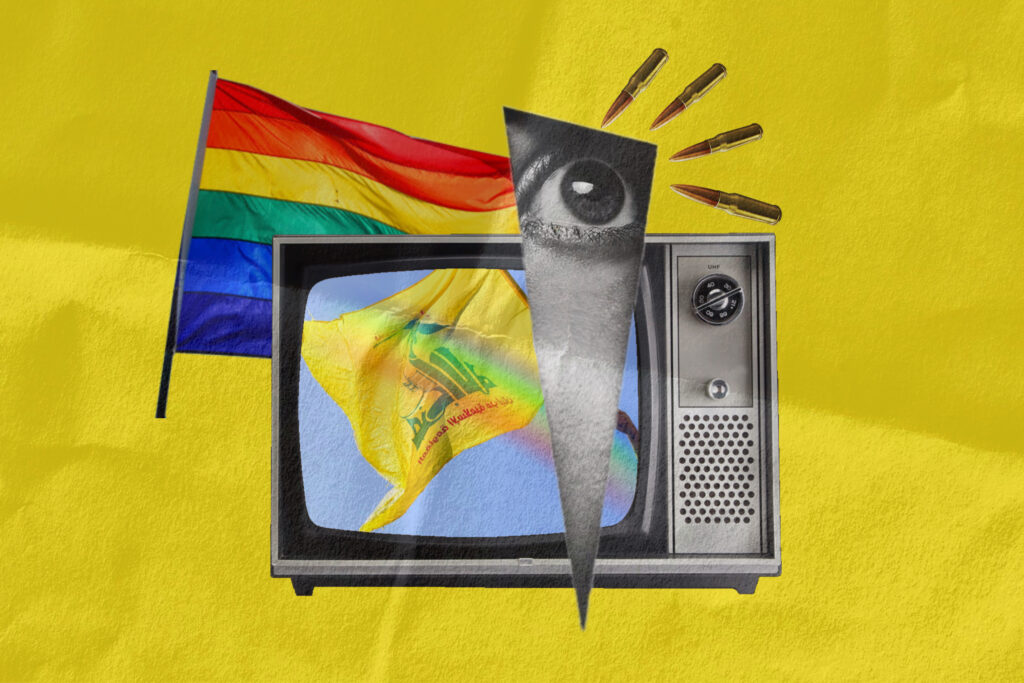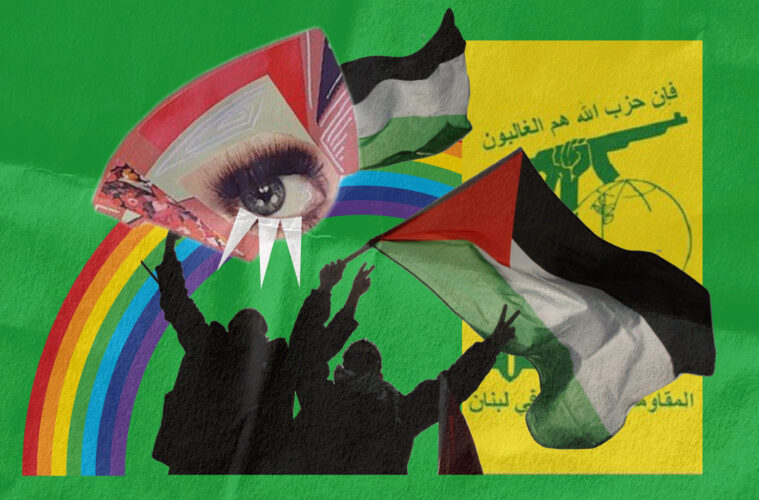Words by Hazem G.
Artworks by Lina A
This article is a supplement within the “Frenquencies” issue
Can the queer1 communities of Lebanon, particularly in the South, mourn the assassination of Hasan Nasrallah? In a region devastated by decades of occupation, war, and imperial violence, this question isn’t just about Nasrallah the man, but what he represents. He embodied resistance against Israeli settler-colonialism and Zionist genocide, which continues to escalate with the explicit approval and direct support of Western powers.
For many queer people in Lebanon, especially those most impacted by war, displacement, and poverty, their grief and allegiance to the resistance comes before any expression of their sexual or gender identity. But the politics of the region – shaped by both the Israeli war machine and Western homonationalism2 – make it nearly impossible for many queer people to openly express their grief for Nasrallah and the terror inflicted without fear of condemnation from both within and outside their communities.
Nasrallah’s leadership in Hezbollah has long made him a polarizing figure in Western narratives, where resistance movements that challenge Zionism are painted as “terrorism.” But this narrative overlooks the lived experiences of those on the ground, who see Hezbollah as a necessary force of defense against Israeli aggression. In 2006, when over one million Lebanese people were displaced by Israeli bombardments, Hezbollah’s resistance became a symbol of survival and dignity in the face of relentless occupation. Yet, despite this reality, queer communities in Lebanon are often coerced into silence by the Western liberal agenda, which rejects any form of solidarity with Hezbollah, conflating resistance to Israeli apartheid with support for violence and setting up a binary between queerness and Hezbollah’s liberation struggle. Queer people, whose lives are shaped by the same violence, are denied the space to mourn.
Nasrallah was not a champion of queer rights, as seen in his public speeches rooted in homophobic rhetoric and alignment with broader social conservatism in Lebanon, and is said to have (re)entrenched stigmatization against LGBTQ+ people across the region. This stance contributes to the risks around sharing or practicing non-normative gender and sexuality, which are often felt more acutely in rural and conservative areas.
But, the identities of queer Lebanese people extend beyond sexual orientation or gender identity. Before they are queer, they are survivors of war, refugees, and members of resistance movements. Often, their queerness must take a backseat to more immediate needs: the right to live, the right to resist occupation, and the right to defend their communities against foreign aggression.
Queer people in the Global South, particularly those involved in resistance movements, should not have to choose between their right to resist and their right to exist as queer individuals.
The repression of queer identities in the Global South, particularly in anti-imperialist states like Lebanon, Uganda, Iraq, and Georgia, is not an isolated phenomenon. These states – in defiance of Western political hegemony and the bundling of LGBTQ+ rights into their broader political agendas – have often resorted to the criminalization of LGBTQ+ identities as part of their broader rejection of Western influence. Uganda’s draconian anti-LGBTQ+ laws are a prime example, as is the repressive legislation seen in Georgia and Iraq. In other words, for these governments, cracking down on queer rights is framed as a form of cultural and political resistance against the West’s moral imperialism.
In this geopolitical landscape, queer people are trapped in a double bind. On one hand, they fear and may face persecution and marginalization in their home countries – whether by the state, other by armed or resistance groups, or social forces – where their identities are politicized as tools of resistance to Western imperialism. On the other hand, in seeking asylum or solidarity from the West, they are expected to conform to a rigid, Western-coded version of queerness that precludes political anti-imperial engagement. Stuck, many are forced to a position of prioritizing one form of their oppression – as Lebanese or as queer – over another, though this is inherently problematic and an unrealistic task.3
The West, which claims to champion LGBTQ+ rights, does so not out of genuine solidarity but to maintain geopolitical control. This tactic is evident in the way asylum seekers are forced to perform stereotypical versions of queer identity to fit Western narratives, as illustrated by Raffia Magazine. Queer refugees must present themselves as palatable and politically aligned with Western ideals, or they risk having their asylum claims denied.
This is the crux of the problem with Western homonationalism4—the co-opting of LGBTQ+ rights as a tool of imperialism. The West selectively champions queer liberation when it aligns with its geopolitical interests, but remains silent when those same queer people resist occupation, colonialism, or capitalist exploitation, and even actively oppresses and demonizes them. Can the West, which remains complicit in Israeli genocide, truly claim to advocate for the liberation of LGBTQ+ people in the Global South? The answer is clear: no, it cannot.

Artworks by Lina A
It’s time for a global LGBTQ+ movement that decouples itself from Western imperialism and recognizes that queer people in the Global South face layered struggles. The fight for queer rights is not separate from the fight against occupation, war, and exploitation. Queer Palestinians, for example, should not have to suppress their identities in the face of Zionist apartheid, nor should queer Lebanese people have to fear denouncement for mourning Hasan Nasrallah, a leader they may see as a defender of their homes and families.
But we cannot ignore the complexities within the resistance movements themselves. Nasrallah’s previous homophobic comment(s) have presented an inescapable tension for queer people in Lebanon and across the region: How do you reconcile your queerness with your support for a movement that allegedly denies your sexual and gender freedoms? For some, the answer is clear: their survival, their faith, and their need to resist foreign domination come first. The fight for basic needs—shelter, safety, and dignity—takes precedence over the fight for LGBTQ+ rights in a context where the very existence of their communities is under constant threat.
This is not to say that the repression of queer identities within these movements should be excused or overlooked. On the contrary, we must critically examine the ways in which conservative social norms within anti-imperialist states have been weaponized to suppress queerness. But we must also resist the Western liberal impulse to judge these movements from a position of detached moral superiority. Queer people in the Global South, particularly those involved in resistance movements, should not have to choose between their right to resist and their right to exist as queer individuals.
To build true global queer solidarity, we must reject the binary choice imposed by the West—either embrace a sanitized, Western-approved version of queerness or be labeled a reactionary, even if you are resisting imperialism. We must recognize that queer liberation cannot be achieved without addressing the broader systems of colonialism, occupation, and global exploitation that shape the lives of queer people in the Global South. A future of genuine queer liberation requires that we listen to those on the frontlines, who are not only fighting for their right to love, but also for their right to resist, to survive, and to live free from imperial domination.
If the global LGBTQ+ movement continues to rely on the crutch of homonationalism, then it is not a force for liberation at all—it is merely another cog in the imperial machine. It’s time for us to envision a queer liberation that transcends borders, refuses to be co-opted by the powers that be, and stands in solidarity with all oppressed people—whether they are resisting bombs, bullets, or borders. Queer people must have the right to mourn their dead, to defend their homes, and to shape their futures free from the shackles of Western imperialism.

